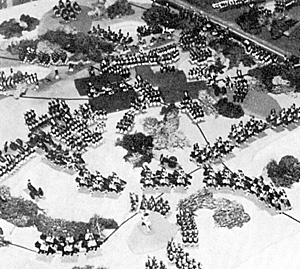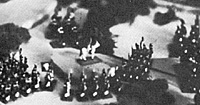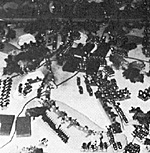The Pavlov Grenadiers suddenly veer away from the road they had been following for the last two turns, and move against a farmyard to their left, threatening the flank of a French 121b battery that has just unlimbered.
"Wait a minute!" yells Napoleon, "Let me see your orders!"
With a sly smile, the wily Kutusov hands a paper, covered with illegible runes, to the French Emperor.
"The Paviovs are ordered to attack around the farmyard," says the Little Corporal, in an icy tone, "not the farmyard itself! Sacre Bleu! What are you trying to pull?"
'`Around the farmyard means 'in the area of' the farmyard," retorts the old Russian. "Any peasant knows that. It's a legal order."
"No, it's not!"..."Yes, it is!"..'No"..."Yes"...
And thus, the fate of two mighty nations is decided.
Weak Link
The weakest link in any set of rules is any section that is open to interpretation or argument. Such a section is not only unclear, but also time-consuming.
The writing of orders to govern the movement of units on the tabletop is an area that often falls into a gray zone of interpretation, especially in the rules depicting my personal interest, Napoleonic Grand Tactics. In this article I'll attempt to deal with some of the problems caused by writing orders, and examine alternatives to it.
Writing orders for units is not inherently bad -- that depends on how detailed or limited the rules or scales are that the orders must take into account or cover.
For example, if the only orders one needs to write, or make note of (as in Column, Line and Square or in Bob Jones' Le Jeu de La Cuerre), are battalion facings, temporary intentions or movement directions, and these orders are limited in number and well-defined, then there is not too much room for interpretation.
Of course, problems can still exist; by drawing pictures of an intended move, as in CLS, interpretation can arise while translating the move to the tabletop. The placement of intention chips in La Guerre still takes time, and, like all "orders" systems, slows down play to a greater or lesser degree.
Still, "orders" are more or less limited at the battalion level, so in these games the gray area need not be too large.
 Overall view of VIVE L'EMPEREUR! game in progress (rules by Ned Zupauko). In this scale game (100 to 1), the cavalry in the foreground comprises a Cavalry Corps!
Overall view of VIVE L'EMPEREUR! game in progress (rules by Ned Zupauko). In this scale game (100 to 1), the cavalry in the foreground comprises a Cavalry Corps!
However, since most Napoleonic gainers, at one time or another, venture beyond tactics and the battalion level, into Grand Tactics (even if, as Bruce Weeks noted in THE COURIER #2, their rules aren't equipped to handle it!), the opportunities for the writing of orders to become a "weak link" multiply.
For example, in his "Empire" rules, Scotty Bowden attempts to go beyond the typical turn-by-turn order (though, significantly, not beyond the battalion level) and have players write "Grand Tactical" orders, that is, telling units or high-level formations what to do, but not how to do it, with one order lasting sev.eral turns or possibly the entire game.
Interpretation
Unfortunately, the more "Grand Tactical" orders become, the more generalized or open to interpretation they must be, with the Napoleon-Kutusov exchange becoming depressingly familiar.
Part of the "interpretation" conflicts may be caused by the maturity of your opponent, or by his lack of ethics" (as discussed by Dick Bryant in his #2 Editorial), but those are not the only reasons.
After all, aren't there many ways of ethically, legally and in good faith interpreting an order like "Support the Life Guards" ?
At first glance, this seems an insurmountable problem -- either play a low-level tactical game with few "orders" problems, or else play a grand tactical game, wide open to interpretation problems.
The problem seems to lie in the use of orders themselves.
By examining the problem closely, however, we may find an alternative. In designing my own grand tactical rules, VIVE L'EMPEREUR! I decided to take another look at the entire concept of orders. Basically, three questions come up -- a) why do we write orders? b) what are the advantages and disadvantages of writing orders, and c) can the disadvantages be eliminated and the advantages simulated in some other way?
 At right, Napoleon sends The Old Guard and Cuirassiers forward. Game using VIVE L'EMPEREUR! Rules by Ned Zupauko.
At right, Napoleon sends The Old Guard and Cuirassiers forward. Game using VIVE L'EMPEREUR! Rules by Ned Zupauko.
Orders
We write orders, basically, for one reason -- to limit the ability of a player to get all of his units to do exactly what he wants, whenever he wants.
By writing orders, a player must commit some forces to a specific action, which prevents them, for a limited time, from reacting to enemy movement.
It also decreases some of the advantages of the "helicopter-view" and 100% intelligence many tabletop generals now enjoy, by forcing an orders commitment before seeing what the enemy is doing.
These ideas can be summed up as FRICTION between the commanders' desires and the actual performance of the units on the field.
- FRICTION as described by Clausewitz
" -- makes that which appears easy in war. difficult
in reality." "Friction is the only conception which
in a general way corresponds to that which
distinguishes real War from War on paper." The
dictionary defines it as "resistance to relative
motion between two bodies in contact" and is
generally meant in this context to encompass
all the imponderable chance occurances and
happenstance by which the best laid plans of
man "gang aft agley" - ED.
Simulating this friction is important if one is trying to simulate history; but there can be a point of diminishing returns in playability in this method. Let's examine some of the disadvantages involved when writing orders in a game.
As already noted, orders are open to interpretation, paper to write the orders is often, especially in large games, spread across the table, and orders-writing is time- consuming. Many games take over an hour to start because players must not only think of what to do, they must also think of how to say it in proper written orders!
Also, though most players prefer to think of their games as comparisons of generalship between players, how many times has the winner been, not the better general, but he who could write the better orders? How many times has a new or inexperienced player lost to a "veteran", not because of tactics, but because he didn't know the tricks of effective order-writing (" But whet I mean/was...").
After all, Napoleon gave orders, but it was Berthier who wrote them! Why should a player have to do both? Isn't his function to try to indicate where he wants units to maneuver to, instead of thinking how he should tell those units to get there?
In addition, with all orders emanating from one player, all units receiving those orders are getting them on an equal basis, negating any effect historical chainof-command or organizational hierarchy may have had.
We must conclude that while we need to simulate friction, writing orders is a poor way, in terms of playability, to do it: but how can we do it without orders?
Without Orders?
First, before considering that question, let's look back a bit. In the old COURIER, Bob Jones and Jim Getz wrote an insightful series of articles entitled "Wargame Analysis". Among the ideas expressed by J im Getz was that of the "Black Box".
The Black Box was the point to which a General input an idea through the Fog of War (friction) and from which he received his response information, which again first travels through the Fog of War. The details of the friction or the Black Box was not essential to the General -- only the responses to his input. Thus, the game could focus on his command level, and not on sundry details out of the General's scope.
With that in mind, let's get back to order-writing, and a heretical thought -- why not eliminate orders altogether?
To have a Black Box effect, allow a player to move units towards any objective he wants on any given turn, but throw in a dice roll (representing, unknown, unexpected and unexplained friction) that would limit the efficacy of those moves.
For VIVE L'EMPEREUR! I've developed that idea into the following system.
No orders are written for units.
All Corps and Army commanders have a given command distance radius -- any units within that radius are automatically active for that turn and may be moved towards any objective.
Each turn, however, each Corps commander makes one dice roll to see if all units under his command who are beyond his command radius are active (that is, able to withstand friction or fog-of-war and still carry out the General's wishes); and therefore possibly still maneuver correctly.
If the roll is successful, those units may also move towards any objective. If unsuccessful, those units may not voluntarily move from that spot that turn, though they may form, face and fight normally while there.
Units within a certain, smaller, distance to Divisional Generals, have a higher chance of activity on the dice roll.
With this system a General can be sure of controlling a small area -- for units further away, he has less control.
Unrealistic
 A question about this system now arises;
suppose a unit was, historically, ordered to march
from point A to point B, a distance equal to five
moves. Isn't it unrealistic to have him move, stop if he
has bad dice, move again and possibly stop again?
Wouldn't he have just kept marching?
A question about this system now arises;
suppose a unit was, historically, ordered to march
from point A to point B, a distance equal to five
moves. Isn't it unrealistic to have him move, stop if he
has bad dice, move again and possibly stop again?
Wouldn't he have just kept marching?
The answer is no; for one thing, the unit not moving due to fog of war or friction may, historically, be due to causes involving other things than just movement conditions. Also, we must consider the "Black Box" idea, and the fact that the final movement is the response to the commander's input of "move to point B".
That is, if it took that unit 8 turns to cover a 5 turn distance we must realize that our Corps Commander does not historically have 100% vision or field intelligence, and that while the game player saw the unit move, the real commander would probably have not seen it, and wouldn't know where the unit was at any given time. He would only know that having ordered the unit to march, he later found out that it took the unit 8 turns to do it. (Remember, of course, that good dice, or the presence of a command figure on the spot, may have allowed a perfect 5 turn response! )
As for why it took 8 turns, consider that as friction. The unit may have marched continuously, but slowly, or perhaps it needed to halt and reorder, or perhaps it encountered a terrain delay. No matter which explanation we choose, it is unimportant. Since we are focusing on the Commander's role and position, it is not important to explain the delay -- only to note that it happened. Using a dice roll for moving/not moving is only a convenient, fast, playable means to an end.
This system does away with taking time away from play to write orders, or to think of ways to phrase orders. In fact, with some units not moving some of the time, there may be less to do in a turn.
No orders, interpretations or arguments are necessary. Friction exists, in that while a General can move units towards any objective, he usually can't predict when or if they'll get there.
Also, though one must contend with fog of war through the demon dice, that chance is at least even for both sides. Instead of taking advantage of an opponent's well-intended, but poorly written, order, to move and attack him while his units march away, one must now calculate time and space, and attack when you guess his units have moved too far away to get back in time.
Historical Comparisons
This system can also simulate some interesting historical comparisons. For example, an 1806 Prussian player may have to make an initiative roll for all units away from the Army command figure, on an equal, low basis, since historically almost all of their units got their orders directly from the General Staff.
Their French opponents, on the other hand, would have numerous, effective, Divisional commanders on the field, thus increasing their chances for activity across the table.
Such a system is also very adaptable to local player variations.
For example, players could increase or decrease command radii or actively roll percentages, to reflect the personalities or abilities of individual generals.
If a General is killed, his replacement could automatically be of lesser ability, or a random roll might produce a military genius who can now rise to a position of command!
Though I've spoken only of the Napoleonic era, eliminating written orders may work equally well for other eras (one place it might be tried is in Ancients rules).
Related:
Back to Table of Contents -- Courier Vol. 1 #4
To Courier List of Issues
To MagWeb Master Magazine List
© Copyright 1979 by The Courier Publishing Company.
This article appears in MagWeb (Magazine Web) on the Internet World Wide Web.
Other military history articles and gaming articles are available at http://www.magweb.com